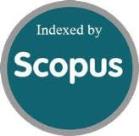Robust Algorithms for Regression Analysis Based on Fuzzy Objective Functions
Keywords:
robust regression, fuzzy complement, linear regression analysisAbstract
In this paper, we address the issues related to the design of fuzzy robust linear regression algorithms. The design of robust linear regression analysis has been studied in the literature of statistics for over two decades. More recently various robust regression models have been proposed for processing noisy data. We proposed a new objective function by using fuzzy complement and derive improved algorithms that can produce good regression analysis from the spoiled data set. Data set from the U.S. Department of Transportation is used to evaluate the performance of the regression algorithms.
References
P. J. Huber and E. M. Ronchetti, Robust statistics, 2nd, New York: Wiley, 2009.
Y. Kopsinis, S. Chouvardas, and S. Theodoridis, “Iterative randomized robust linear regression,” International Conference on Acoustics, Speech and Signal Processing, pp. 5436-5540, April 2015.
G. Papageorgiou, P. Bouboulis, and S. Theodoridis, “Robust linear regression analysis—a greedy approach,” IEEE Transactions on Signal Processing, vol. 63, no. 15, pp. 3872-3887, May 2015.
D. Huang, R. Cabral, and F. De la Torre, “Robust regression,” IEEE Transactions on Pattern Analysis and Machine Intelligence, vol. 38, no. 2, pp. 363-375, February 2016.
G. L. Cheng, F. Y. Zhu, S. M. Xiang, Y. Wang, and C. H. Pan, “Semisupervised hyperspectral image classification via discriminant analysis and robust regression,” IEEE Journal of selected topics in applied earth observations and remote sensing, vol. 9, no. 2, pp. 595-608, September 2016.
A. Nurunnabi, G. West, and D. Belton, “Robust locally weighted regression techniques for ground surface points filtering in mobile laser scanning three dimensional point cloud data,” IEEE Transaction on Geoscience and Remote Sensing, vol. 54, no. 4, pp. 2181-2193, November 2015.
Downloads
Published
How to Cite
Issue
Section
License
Submission of a manuscript implies: that the work described has not been published before that it is not under consideration for publication elsewhere; that if and when the manuscript is accepted for publication. Authors can retain copyright of their article with no restrictions. Also, author can post the final, peer-reviewed manuscript version (postprint) to any repository or website.

Since Oct. 01, 2015, PETI will publish new articles with Creative Commons Attribution Non-Commercial License, under The Creative Commons Attribution Non-Commercial 4.0 International (CC BY-NC 4.0) License.
The Creative Commons Attribution Non-Commercial (CC-BY-NC) License permits use, distribution and reproduction in any medium, provided the original work is properly cited and is not used for commercial purposes



